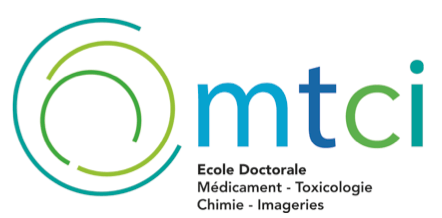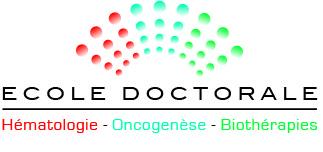Doctoral school
Doctoral school MTCI ED 563 “Drugs, Toxicology, Chemistry, Imagery”
Since June 2016, the Drug, Toxicology, Chemistry, Imagery doctoral school (MTCI ED 563) has been co-accredited with PSL.The ED covers a broad multi-disciplinary field, ranging from fundamental problems to clinical applications, with biomedical and therapeutic research as a common thread. The objective of the graduate school is to offer doctoral students a rich and stimulating multidisciplinary environment, allowing them to enrich their initial skills in order to better understand problems at the chemistry/biology/health interface.
It also benefits from efficient operational structures (Pôle Collège des Écoles Doctorales & HDR (CED), USPC Collège des Ecoles Doctorales, Centre de Formation et D’Initiative Professionnelle) to best prepare doctoral students for their future careers by offering them a range of complementary professional training and experience.
Hosting teams :
>Vectors for Molecular Imaging and Therapeutic Targeting
team leader : Nathalie MIGNET
>Biotherapies by nucleic acid vectorization..
team leader : Virginie ESCRIOU

Doctoral school HOB ED 561 “oncogenic hematology and biotherapies”
The HOB Doctoral School supports experimental and clinical work aimed at elucidating specific oncogenesis mechanisms of different types of solid or hematopoietic tumors in order to develop medical tools for personalized cancer management (diagnosis, treatment and follow-up). Genomics, proteomics, biochemistry and cell biology approaches to tumor cells and the microenvironment are favored as well as the construction of relevant preclinical models in rodents (xenografts and genetic models). The interface theses involving aspects of bioinformatics are integrated into the themes of the Doctoral School. Theses dealing with clinical research and the identification and development of biomarkers will be encouraged.
The School also encourages thesis topics on normal stem cells (hematopoietic and other tissues) and the definition of differential signatures between normal stem cells and tumor initiating cells.
The School continues its work in the fields of gene therapy and cell therapy including hematopoietic stem cell transplantation and histocompatibility aspects. The study of cell interactions (stromal cells, endothelial cells, osteoblasts, immune response cells…) and the in vivo demonstration of these interactions will justify projects in the field of biotherapies
The School will promote the study of stem cells (embryonic stem cell, placental blood stem cell, mesenchymal stem cell) for the development of new tools for therapy both in the study of plasticity and their vectorization (including aspects of virology). Imaging projects applied to the clinic will also be supported.
Hosting team
>Hematopoiesis – Modulation by cytokines..
Team manager : Salima HACEIN-BEY ABINA

